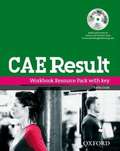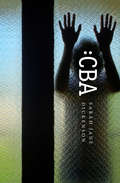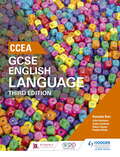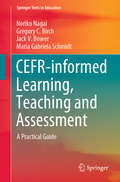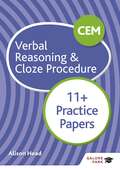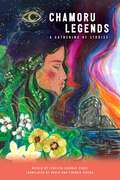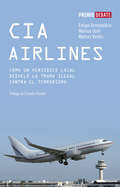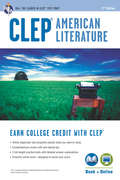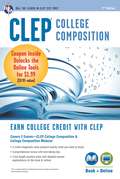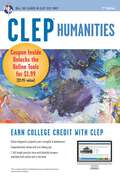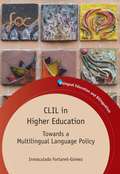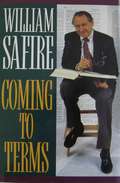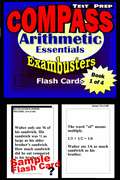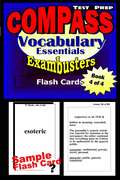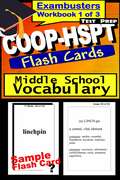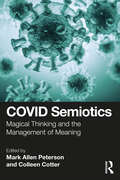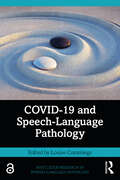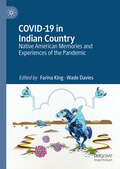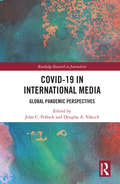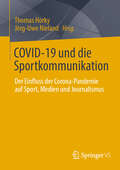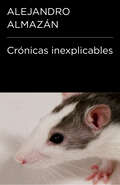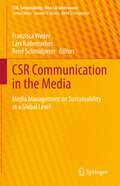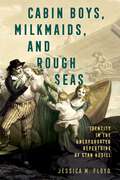- Table View
- List View
C.S. Lewis on Politics and the Natural Law
by Justin Buckley Dyer Micah J. WatsonConventional wisdom holds that C. S. Lewis was uninterested in politics and public affairs. The conventional wisdom is wrong. As Justin Buckley Dyer and Micah J. Watson show in this groundbreaking work, Lewis was deeply interested in the fundamental truths and falsehoods about human nature and how these conceptions manifest themselves in the contested and turbulent public square. Ranging from the depths of Lewis' philosophical treatments of epistemology and moral pedagogy to practical considerations of morals legislation and responsible citizenship, this book explores the contours of Lewis' multi-faceted Christian engagement with political philosophy generally and the natural-law tradition in particular. Drawing from the full range of Lewis' corpus and situating his thought in relationship to both ancient and modern seminal thinkers, C. S. Lewis on Politics and the Natural Law offers an unprecedented look at politics and political thought from the perspective of one of the twentieth century's most influential writers.
CAE Results: Workbook Resource Pack with Key
by Kathy Gude Lynda EdwardsThe new multi-level exam preparation series for Cambridge ESOL exams which inspires students to better exam results.
CBA
by Sarah Jane DickensonTrialled in schools with young people, CBA is a play that asks the really urgent questions of today. It seems so private, just you and the screen. You click 'send'. Then the whole world crashes through. Keisha has a secret, Georgia has a security problem and Tom is afraid to speak out. When should you tell someone's secret? How can jokes go so wrong? Fast paced and thought-provoking , CBA examines growing up in a digital world.
CCEA GCSE English Language, Third Edition Student Book
by Jenny Lendrum Amanda Barr Aidan LennonThis title has been endorsed for use with the CCEA GCSE English Language specificationEnsure that every student can achieve their best with the market-leading Student Book for CCEA GCSE English Language, fully updated for the 2017 specification with a rich bank of stimulus texts, classroom activities and assessment support.- Offers expert coverage of the new examined elements of the specification (Reading Literary Texts and Creative Writing) from an author with extensive teaching and examining experience- Develops strong reading and writing skills as students work through step-by-step guidance and progressive activities matched to the Assessment Objectives- Provides effective models for students' own writing for different purposes and genres by including a range of literary and non-fiction text extracts- Thoroughly prepares students for assessment with practice questions, sample student responses and trusted advice on the examinations and Controlled Assessment- Helps students monitor their learning and identify their revision needs using self-assessment criteria at the end of each unit
CCEA GCSE English Language, Third Edition Student Book
by Jenny Lendrum Amanda Barr Aidan Lennon Pauline WylieExam Board: CCEALevel: GCSESubject: EnglishFirst Teaching: September 2017First Exam: June 2019This title has been endorsed for use with the CCEA GCSE English Language specificationEnsure that every student can achieve their best with the market-leading Student Book for CCEA GCSE English Language, fully updated for the 2017 specification with a rich bank of stimulus texts, classroom activities and assessment support.- Offers expert coverage of the new examined elements of the specification (Reading Literary Texts and Creative Writing) from an author with extensive teaching and examining experience- Develops strong reading and writing skills as students work through step-by-step guidance and progressive activities matched to the Assessment Objectives- Provides effective models for students' own writing for different purposes and genres by including a range of literary and non-fiction text extracts- Thoroughly prepares students for assessment with practice questions, sample student responses and trusted advice on the examinations and Controlled Assessment- Helps students monitor their learning and identify their revision needs using self-assessment criteria at the end of each unit
CEFR-informed Learning, Teaching and Assessment: A Practical Guide (Springer Texts in Education)
by Noriko Nagai Gregory C. Birch Jack V. Bower Maria Gabriela SchmidtThis book is a practical guide to the Common European Framework of Reference for Languages: Learning, Teaching, Assessment (CEFR) (Council of Europe 2001) and the CEFR Companion Volume (CEFR/ CV; COE 2018), which have increasingly been used to inform the language policies and teaching practices of countries within and outside of Europe. It helps practitioners to (i) grasp essential and core concepts of the Common European Framework of Reference, (ii) identify parts of the CEFR and the CEFR/CV as well as other CEFR-related resources and documents that are relevant for readers’ different purposes, and (iii) utilise and adapt these resources for their own needs. Written by practitioners for practitioners, this hands-on guide covers the philosophy of the CEFR, curricula, assessment, learner autonomy, the task-based approach, and teacher development. Logically explaining all aspects of the framework and its application, this manual helps readers deal with many of the difficulties encountered when using CEFR and the CEFR CV.The book will appeal to a wide audience, including teacher educators; curriculum and materials developers; examination boards unfamiliar with the CEFR; university language departments and language centres responsible for developing their own curricula, teaching/learning approaches and assessment instruments; and policy-makers wanting to learn more about the implications of adopting the CEFR. It is a guidebook, a reference book and a workbook all in your hand.
CEM 11+ Verbal Reasoning & Cloze Procedure Practice Papers
by Alison HeadPractice exam papers to test pupils ahead of the CEM 11+ Verbal Reasoning test, including those taking bespoke tests created by CEM for individual schools. Four levelled papers test pupils' skills in verbal reasoning and cloze procedure.The papers are designed to:- Develop and perfect exam technique for all CEM 11+ tests- Teach pupils to improve their response rates with timed papers- Provide a variety of question formats to suit paper-based and online tests- Identify weaker areas and improve results by studying the answers, which contain references to Galore Park's revision materials for guidance and useful tips- The resource also contains links to downloadable answer sheets so that the tests can be re-sat.These practice papers are part of Galore Park's 11+ revision series, which provides a three-step learning journey that teaches children the skills needed to pass rigorous school entrance exams.
CHamoru Legends: A Gathering of Stories
by Teresita Lourdes PerezCHamoru Legends retells twelve CHamoru legends and features personal reflections from author Teresita Lourdes Perez, unique illustrations of each legend by Guam artists, and versions of the legends in the CHamoru language by Maria Ana Tenorio Rivera. The book includes CHamoru classics like the story of the siblings who created the universe; the two lovers who were pushed to the edge of a cliff because their union was forbidden; and the tale of the son who leapt an island away to escape his jealous father.CHamoru Legends is the 2020 Independent Publisher Book Awards Bronze Medal recipient for Best Regional Fiction for Australia/New Zealand/Pacific Rim.It is a reversible book featuring the legends in English on one side and in CHamoru on the other. Through multiple layers of interpretation, the book weaves together strips of wisdom and cultural lessons like the leaves used to shape the CHamoru guåfak, or mat, upon which the earliest CHamoru storytellers sat sharing their versions of these timeless tales.
CIA Airlines: Cómo un periódico de provincias desveló la trama ilegal contra el terrorismo
by Felipe Armendáriz Marisa Goñi Matías VallésPREMIO DEBATE El 6 de septiembre de 2006 el presidente Bush admitía públicamente la existencia de una red de prisiones secretas organizadas por la CIA. Así culminaba en parte una odisea periodística que comenzó casi un año y medio antes, el 12 de marzo de 2005, cuando Diario de Mallorca titulaba a toda página «La CIA utiliza Son Sant Joan como base de su avión cárcel». Desde entonces las noticias sobre los vuelos de la CIA a través de territorio europeo, en los que presuntamente se trasladaron ilegalmente sospechosos de terrorismo islámico, no han abandonado las primeras páginas de los periódicos. Y detrás de las querellas ante la Audiencia Nacional, los informes del Parlamento Europeo y las portadas del New York Times, está el trabajo de tres periodistas de Diario de Mallorca, que desde un medio regional han llevado a cabo una sobresaliente investigación, merecedora del primer premio Debate de libro reportaje, que ha destapado las oscuras maniobras de los servicios de inteligencia estadounidenses en la «Guerra contra el Terror». En este fascinante libro, el equipo de Diario de Mallorca que sacó a la luz el asunto cuenta la historia de los aviones prisión de la CIA en España, con especial énfasis en el papel de Mallorca y con una mirada a las repercusiones mediáticas mundiales y a la aparición en la era de Internet de un nuevo periodismo no sólo en la difusión, sino sobre todo en la elaboración de las noticias.
CLEP® American Literature Book + Online (CLEP Test Preparation)
by Jacob StratmanEarn College Credit with REA's Test Prep for CLEP® American Literature Everything you need to pass the exam and get the college credit you deserve.CLEP® is the most popular credit-by-examination program in the country, accepted by more than 2,900 colleges and universities. For over 15 years, REA has helped students pass the CLEP® exam and earn college credit while reducing their tuition costs. Our CLEP® test preps are perfect for adults returning to college (or attending for the first time), military service members, high-school graduates looking to earn college credit, or home-schooled students with knowledge that can translate into college credit. There are many different ways to prepare for the CLEP® exam. What's best for you depends on how much time you have to study and how comfortable you are with the subject matter. Our test prep for CLEP® American Literature and the free online tools that come with it, will allow you to create a personalized CLEP® study plan that can be customized to fit you: your schedule, your learning style, and your current level of knowledge.Here's how it works:Diagnostic exam at the REA Study Center focuses your studyOur online diagnostic exam pinpoints your strengths and shows you exactly where you need to focus your study. Armed with this information, you can personalize your prep and review where you need it the most. Most complete subject review for CLEP® American Literature Our targeted review covers the material you'll be expected to know for the exam and includes a glossary of must-know terms. Two full-length practice examsThe online REA Study Center gives you two full-length practice tests and the most powerful scoring analysis and diagnostic tools available today. Instant score reports help you zero in on the CLEP® American Literature topics that give you trouble now and show you how to arrive at the correct answer - so you'll be prepared on test day. REA is the acknowledged leader in CLEP® preparation, with the most extensive library of CLEP® titles available. Our test preps for CLEP® exams help you earn valuable college credit, save on tuition, and get a head start on your college degree.
CLEP® College Composition 2nd Ed., Book + Online (CLEP Test Preparation)
by Ken Springer Dominic Marulllo Rachelle SmithSave time and money while you earn college credit. Pass your CLEP exam and get college credit at a fraction of the cost of a college course with REA's Prep for CLEP.Our exclusive Book + Online prep includes:Online diagnostic exam: Pinpoint what you know and what you need to study. Test-aligned subject review: Zero in on the topics you'll find on the exam. Four realistic practice exams: Measure your test-readiness so you'll be confident and prepared on test day. Expert advice from authors who know the test inside out. Glossary of key terms: Round out your prep with must-know vocabulary. This study guide prepares you for both the College Composition and College Composition Modular exams. REA is America's recognized leader in CLEP test prep and is your trusted source for the most up-to-date, aligned content. If you're looking to accelerate your path to a college degree, CLEP is perfect for you. And thanks to our partners at Proctortrack (proctortrack.com/clep), now you can take your exam at your convenience, from the comfort of home.
CLEP® Humanities Book + Online (CLEP Test Preparation)
by Robert Liftig Marguerite BarrettEarn College Credit with REA’s Test Prep for CLEP Humanities Everything you need to pass the exam and get the college credit you deserve. REA leads the way in helping students pass their College Board CLEP exams and earn college credit while reducing their tuition costs. With 25+ years of experience in test prep for the College-Level Examination Program (CLEP), REA is your trusted source for the most up-to-date test-aligned content. Whether you’re an adult returning to finish your degree, a traditional-age college student, a military service member, or a high school or home-schooled student looking to get a head start on college and shorten your path to graduation, CLEP is perfect for you. REA’s expert authors know the CLEP tests inside out. And thanks to our partners at Proctortrack (proctortrack.com/clep), you can now take your exam at your convenience, from the comfort of home. Prep for success on the CLEP Humanities exam with REA’s personalized three-step plan: (1) focus your study, (2) review with the book, and (3) measure your test-readiness. Our Book + Online prep gives you all the tools you need to make the most of your study time: Diagnostic exam: Pinpoint what you already know and what you need to study.Targeted subject review: Learn what you’ll be tested on.Two full-length practice exams: Zero in on the topics that give you trouble now so you’ll be confident and prepared on test day.Glossary of key terms: Round out your prep with must-know vocabulary.REA is America’s recognized leader in CLEP preparation. Our test prep helps you earn valuable college credit, save on tuition, and accelerate your path to a college degree.
CLIL in Higher Education
by Inmaculada Fortanet-GomezThis book offers a unique view of multilingualism in higher education from a global perspective. It presents a contextualised case of a multilingual language policy which takes the Content and Language Integrated Learning (CLIL) approach. The volume discusses various approaches to multilingual education including CLIL and then proposes guidelines for a multilingual language policy for Universitat Jaume I in Castelló, Spain. It examines the advantages of a multilingual education programme and reviews the success of existing language policies. This book will be an essential resource for researchers and students as well as policy makers.
COMING TO TERMS
by William SafireWhen William Safire delineates the difference between misinformation and disinformation or "distances himself" from clichés, people sit up and take notice. Which is not to say that Safire's readers always take the punning pundit at his word: they don't, and he's got the letters to prove it. Among the entries in Coming to Terms, this all-new collection of Safire's "On Language" columns, you'll read the repartee of Lexicographic Irregulars great and small. John Haim of New York sets in concrete what properly to call a cement truck, while Charlton Heston challenges an interpretation of Hamlet's "to take arms against a sea of troubles" and Gene Shalit passes along his favorite Yogi Berra-ism. Bringing them all together are dozens of Safire's most illuminating and witty columns, from "Right Stuffing" to "Getting Whom." When William Safire comes to terms, there's never a dull moment.
COMPASS Test Prep Flash Cards: Arithmetic Essentials (Exambusters COMPASS Workbook #1 of 4)
by Ace Inc.<P><P><i>Advisory: Bookshare has learned that this book offers only partial accessibility. We have kept it in the collection because it is useful for some of our members. Benetech is actively working on projects to improve accessibility issues such as these.</i><P><P> 600 questions and answers highlight essential arithmetic definitions, problems, and concepts. <P><P>Topics: Addition, Subtraction, Multiplication, and Division of Whole Numbers; Fractions and Decimals, Multiplication Tables, Word Problems, Percents, Measurement, Metric System, Square Roots and Powers, Real Numbers, Properties of Numbers <P> Exambusters COMPASS Prep Workbooks provide comprehensive, fundamental COMPASS review--one fact at a time--to prepare students to take practice COMPASS tests. Each COMPASS study guide focuses on one specific subject area covered on the COMPASS exams. From 300 to 600 questions and answers, each volume in the COMPASS series is a quick and easy, focused read. Reviewing COMPASS flash cards is the first step toward more confident COMPASS preparation and ultimately, higher COMPASS exam scores!
COMPASS Test Prep Flash Cards: Vocabulary Essentials (Exambusters COMPASS Workbook #4 of 4)
by Ace Inc.<P><P><i>Advisory: Bookshare has learned that this book offers only partial accessibility. We have kept it in the collection because it is useful for some of our members. Benetech is actively working on projects to improve accessibility issues such as these.</i><P><P> 500 essential words every student should know. Includes sample sentence, part of speech, pronunciation, succinct, easy-to-remember definition, and common synonyms and antonyms. <P><P> Exambusters COMPASS Prep Workbooks provide comprehensive, fundamental COMPASS review--one fact at a time--to prepare students to take practice COMPASS tests. Each COMPASS study guide focuses on one specific subject area covered on the COMPASS exams. From 300 to 600 questions and answers, each volume in the COMPASS series is a quick and easy, focused read. Reviewing COMPASS flash cards is the first step toward more confident COMPASS preparation and ultimately, higher COMPASS exam scores!
COOP-HSPT Test Prep Flash Cards: Middle School Vocabulary (Exambusters COOP-HSPT Workbook #1 OF 3)
by Ace Inc.<P><P><i>Advisory: Bookshare has learned that this book offers only partial accessibility. We have kept it in the collection because it is useful for some of our members. Benetech is actively working on projects to improve accessibility issues such as these.</i><P><P> 300 basic words every high school freshman should know. <P><P>Includes part of speech, pronunciation, succinct, easy-to-remember definition, and common synonyms and antonyms. <P>EXAMBUSTERS COOP and HSPT Prep Workbooks provide comprehensive, fundamental COOP and HSPT review--one fact at a time--to prepare students to take practice COOP and HSPT tests. Each COOP and HSPT study guide focuses on one specific subject area covered on the COOP and HSPT exams. From 300 to 600 questions and answers, each volume in the COOP and HSPT series is a quick and easy, focused read. Reviewing COOP and HSPT flash cards is the first step toward more confident COOP and HSPT preparation and ultimately, higher COOP and HSPT exam scores!
COVID Semiotics: Magical Thinking and the Management of Meaning
by Colleen Cotter Mark Allen PetersonThis book examines how people around the world have articulated and shaped their experiences of COVID-19 through a sociolinguistic phenomenon known as magical thinking. Using case studies from throughout the world–China, Egypt, Europe, Jordan, Thailand, East Jerusalem, the UK, and the US–this volume looks at how people managed ambiguity and uncertainty, risk, and social isolation by viewing their experiences of the pandemic as other than, or alongside, those presented by voices and images representing scientifically derived knowledge. Each chapter in the volume introduces the reader to a core semiotic concept and shows how it can be used to analyze and unpack a specific signifying practice. In the conclusion, the several concepts from the chapters–ideological positioning, entextualization and recontextualization, double-voicing, discursive grafting, imaging, and contagion–are revisited and synthesized, in order to demonstrate that semiotics is useful not only in ethnographic studies of various “others” and of various "crises," but also in explaining the quotidian experiences of everyday life. Ultimately, this book reveals that COVID-related magical thinking practices are often as “contagious” as the virus they reimagine, spreading through social media and resulting in such social phenomena as viral videos promoting and rejecting public health practices, the first-lockdown stockpiling of toilet paper and hand sanitizer, resistance to public health recommendations, anti-vax rhetoric, and competing interpretations of emerging public health data. This book not only represents cutting-edge research in the field, but it also provides students of anthropology, linguistics, media, and communication with the vocabulary and conceptual framework to understand the human experience of the COVID-19 pandemic.
COVID-19 and Speech-Language Pathology (Routledge Research in Speech-Language Pathology)
by Louise CummingsThis collection is the first of its kind to examine the impact of the COVID-19 pandemic on the caseloads and clinical practice of speech-language pathologists. The volume synthesises existing data on the wide-ranging effects of COVID-19 on the communication, swallowing, and language skills of individuals with COVID infection. Featuring perspectives of scholars and practitioners from around the globe, the book examines the ways in which clinicians have had to modify their working practices to prioritise patient and clinician safety, including the significant increase in the use of telepractice during the pandemic. The volume also reflects on changes in training and education which have seen educators in the field redesign their clinical practicum in order to best prepare students for professional practice in an age of COVID-19 and beyond, as the field continues to grapple with the long-term effects of the pandemic. Offering a holistic treatment of the impact of COVID-19 on the work of speech-language pathologists, this book will be of interest to students, researchers, and clinicians working in the discipline. Chapters 5, 6, 10, and 13 of this book are freely available as downloadable Open Access PDFs under a Creative Commons Attribution-Non Commercial-No Derivatives 4.0 license available at http://www.taylorfrancis.com
COVID-19 in Indian Country: Native American Memories and Experiences of the Pandemic
by Wade Davies Farina KingAs the COVID-19 pandemic struck peoples throughout the world, it disproportionately devastated Native American communities. The inequalities, disparities, and injustices they had long experienced as historically marginalized peoples magnified the effects of this crisis throughout Indian Country, causing high hospitalization and death rates, as well as intense economic and social dislocation. This edited volume seeks to tell stories of Native Americans facing this matrix of disease and colonialism in these pandemic years while also highlighting ways that Indigenous people innovated, bonded, and endured through this crisis. It features Indigenous perspectives and experiences through scholarly and creative pieces including short stories, visual art, and academic and personal narratives. Contributors ask how past experiences and traumas have contextualized Native people’s responses to COVID-19 and how intergenerational knowledge and ties have sustained their communities during the pandemic.
COVID-19 in International Media: Global Pandemic Perspectives (Routledge Research in Journalism)
by John C. Pollock; Douglas A. VakochCovid-19 in International Media: Global Pandemic Responses is one of the first books uniting an international team of scholars to investigate how media address critical social, political, and health issues connected to the 2020-21 COVID-19 outbreak. The book evaluates unique civic challenges, responsibilities, and opportunities for media worldwide, exploring pandemic social norms that media promote or discourage, and how media serve as instruments of social control and resistance, or of cooperation and representation. These chapters raise significant questions about the roles mainstream or citizen journalists or netizens play or ought to play, enlightening audiences successfully about scientific information on COVID-19 in a pandemic that magnifies social inequality and unequal access to health care, challenging popular beliefs about health and disease prevention and the role of government while the entire world pays close attention. This book will be of interest to students and faculty of communication studies and journalism, departments of public health, sociology, and social marketing.
COVID-19 und die Sportkommunikation: Der Einfluss der Corona-Pandemie auf Sport, Medien und Journalismus
by Jörg-Uwe Nieland Thomas HorkyCOVID-19 hat die Sportkommunikation nachhaltig verändert. Der Band bietet empirische Analysen, Einschätzungen und theoretische Ansätze sowie Erfahrungsberichte aus der Praxis zum Einfluss der Corona-Pandemie auf Medien, Journalismus und Sport. Aus unterschiedlichen Perspektiven schauen Wissenschaftlerinnen und Wissenschaftler sowie Personen aus der Praxis auf die Veränderungen in verschiedenen Medien- und Sportorganisationen sowie den Wandel von Produktions- und Arbeitsbedingungen innerhalb der Sportkommunikation. Gleichzeitig lassen sich erste Prognosen für einen Ausblick auf die Zukunft des Mediensports ableiten.
CRONICAS INEXPLICABLES
by Alejandro AlmazánUn fantástico libro de crónicas por Alejandro Almazán, autor de El más buscado. Por estas páginas desfilan un narco sin suerte: Jota Erre, quien luego de seis intentos (fallidos) de incursionar en el negocio del siglo, decidió dedicarse a la cantada; las ratas gigantes de Atascaderos, Chihuahua, que aún asuelan a la población y que las autoridades siguen ignorando; los 200 mil dólares que Margarito "encontró" en el cerro y que le valieron la ruina; el exorcismo que en el año 2000 dejara un saldo de siete muertos y 70 mil incógnitas en una pequeña población de Tlaxcala. Acérquese. Adéntrese en estas historias. Inexplicables, escritas por uno de los mejores cronistas mexicanos de la actualidad.
CSR Communication in the Media: Media Management on Sustainability at a Global Level (CSR, Sustainability, Ethics & Governance)
by Lars Rademacher René Schmidpeter Franzisca WederCorporate social responsibility (CSR) is an established management focus of today's companies and organizations of different types, scope and size. Communication practices on CSR and sustainability in the media industry, related theoretical concepts, and empirical foundations have not yet been sufficiently explored. This book focuses on a new normative framework of sustainability, bridging the established debate on public value with the current debate on social impact and the social license to operate in the media industry. With a variety of contributions from theory and practice, the book addresses the dual nature of media and media companies, which simultaneously produce economic and cultural goods and thus bear a "double responsibility": on the one hand, for the way they present reality, monitor and criticize economic and political developments, and bring ethical concerns to the public debate. On the other hand, they bear responsibility for their own activities as companies (license to operate). The book is therefore aimed at readers interested in the journalistic perspective and at executives in the media industry.
Cabin Boys, Milkmaids, and Rough Seas: Identity in the Unexpurgated Repertoire of Stan Hugill
by Jessica M. FloydDuring his correspondence with erotic folklore collector Gershon Legman, famed chantey singer and collector Stan Hugill (1906–1992) shared unexpurgated versions of the songs in his repertoire. These bawdy songs were meant to be a part of Legman’s larger project concerning erotic folksong. Upon Legman’s death in 1999, the unfinished and unpublished manuscript sank into obscurity and was believed by many to be permanently lost. Thankfully this “holy grail” of chantey texts had been safe in the private collection of Legman’s widow, Judith Legman, all along. Cabin Boys, Milkmaids, and Rough Seas: Identity in the Unexpurgated Repertoire of Stan Hugill is the first critical investigation of this repository, reproduced here for the first time. Training an interdisciplinary lens on twenty-four unexpurgated texts, author Jessica M. Floyd interrogates the articulation of gender, sexuality, and identity as it is expressed in these cultural artifacts of the sea. Opening with both a critical explication of the chantey genre, as well as situating Hugill’s repertoire in the canon of folksong, the book introduces readers to the critical realities that attend this rich cultural tradition. Analytical chapters demonstrate the kaleidoscopic representation of gender and sexuality in this finite repertoire. Each inquiry is connected and overlapping, demonstrating an ebb and flow not unlike the waters on which the songs were sung. Words of warning, heteronormative economies, and queer undercurrents each collide to present an image of sailing life that is nuanced and complicated, provocative and evocative, transgressive and sometimes radical. The volume allows scholars to place a finger on the pulse of maritime life, feeling and experiencing one voice among the din of working-class song traditions.

